Shirobako – On Cynical Optimism
Shirobako ended in the only way it could, and in the way its narrative arc had outlined from the beginning. Shirobako ended on an optimistic note, and I felt betrayed by it.
Since like many of the best pieces of media out there, Shirobako is about life, and since this post, as is the case with most of what people write, will hinge upon my personal experiencing of it, mediated through my own experiences, I will now get to do what bloggers the world over love doing: Write a bit about myself. Also, that sure was a long sentence.
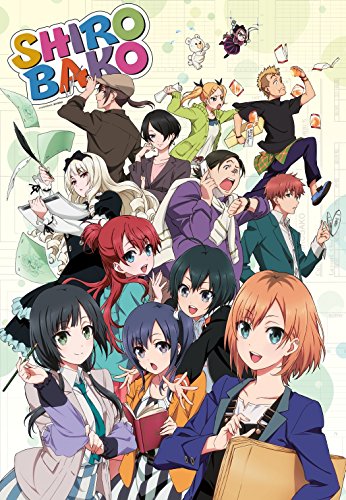
I’m not an old person, but I definitely fall under the heading of “adult”, and am older than what the average anime-watcher in online communities is. I’ve served three years in the military, and between my B.A. and M.A. had the opportunity (and need) to work for several years, full-time. I’m no stranger to insufferable co-workers, implicit threats of physical violence, burdens heaped upon the capable until they buckle, unlistening leaders, and more. More-over, and this is the salient part, I came into workplaces expecting these things, so perhaps I gave them a larger place in my mental landscape than they objectively took up, but perhaps even that is a comfortable lie. I’m a cynical optimist, and this is relevant to my reaction to the show, and to much of anime’s storytelling in this regard.
(This is not a review, but more a discussion of the show and of ideas that rose in my mind as a result of watching the show. There will be spoilers for the entire show.)
Most media revolves around transitional periods, when some change comes to the characters it revolves around. Transitional periods would be, for instance, joining highschool, leaving highschool, entering the workforce, or when a zombie invasion turns your life over. Anime seems to focus mostly on the first two, and sometimes sprinkles the last. “Entering highschool” is especially interesting because after a while, the transition is over and the series can relax into a holding pattern, which is how nostalgia is conveyed, and also provides a comfortable and natural “ending point” to the series, which will be yet another transitional period.
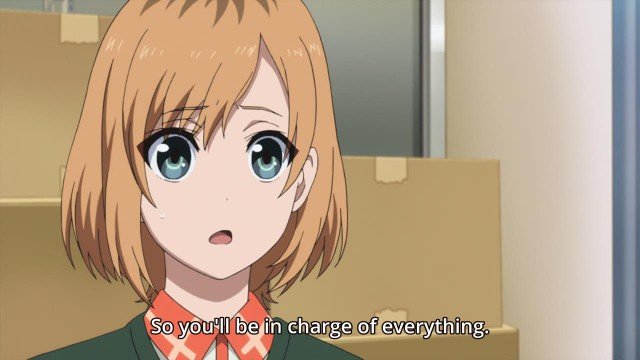
The more anime I watched, the more I noticed the lack of anime dealing with transitioning into being an adult, or with life as an actual adult, rather than “foreboding assassin” where one’s age, mental or otherwise, is but a minor detail. Two of the best anime series out there deal with exactly these issues, with the fears, hopes, and failures of the time leading up to becoming a working adult, and those would be Genshiken, and Welcome to the N.H.K. I thought very highly of both shows, so Shirobako, a show that I felt would deal with those same issues, and with the same aura of fear and failure and cynicism to boot? I was overjoyed. Well, as much as a fun-hating cynic such as I can be.
And there we finally get to Shirobako, and why I was only disappointed, for a while, with its ending, rather than its entire run. Shirobako follows Miyamori Aoi, who’s a put-upon but cheerful girl. Cheerful? She’s cheering herself on in the face of having to work with people like Tarou who put in a negative amount of work (they cause everyone around them to have to put in more effort), Hiraoka who seemed to actively try to sabotage her efforts by directing her to people who could not put in the effort as a gentle form of hazing that she who is his junior was given more responsibility, a director who can never meet his deadlines, and it all cascades from there.
Shirobako is a very educational show, in that it tells us a lot about the way in which the anime we watch is produced. It shows us the sort of constant crunch the people who work on the products we consume are under. It’s considerably more educational than that, because it shows us a workplace, a genuine workplace, which many of the ones we’ll work in during our lifetimes will mirror. This sort of “crunch” that anime productions and programmers go under just before shipping may be more extreme, but all workplaces seem to have this constant struggle of crunch, of looming deadlines, of having to work in the face of inhospitable outsiders, indifferent co-workers, and sabotaging circumstances. This is life.
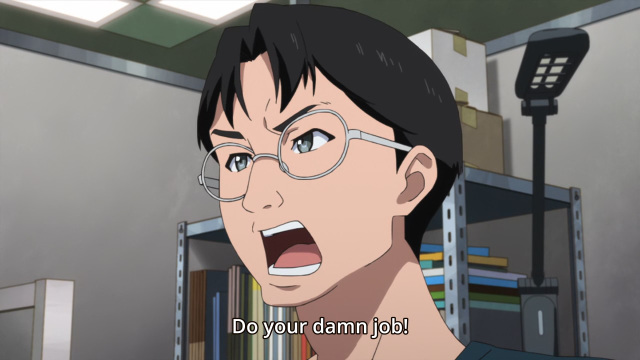
Shirobako is an educational series in other ways as well, didactic even, as it tries to pass on its morals. “Be a good worker” isn’t preached outright, but shows us how people must take on more work when not everyone shares the load. It relies on our intrinsic goodness to pick this up. Miyamori and her friends often feel dejected as they buckle under the insane work load, as they compare their progress to their goals, and find they’re not even in the right workplace, but apparently are “wasting their time”. But the show goes to lengths to show that experience is valuable, even if it is “near” what you went for. The show shows us that even after twenty years creating anime, you can say “screw it” and go and start baking cakes. That we can start anew, even if we wasted time, and that sometimes wasted time isn’t all that wasteful.
But Shirobako, like me, is cynically optimistic. It might seem as an oxymoron, but it is cynicism that serves as a shell to protect that weakest of spirits Pandora released from the cruel world; hope. It is optimism that our cynicism might not be proven true once more. But think of all those lessons that Shirobako teaches us, and think of that “good ending”. Think back to Job’s tale. He was given new riches and children by God, but his suffering was not erased, and his first batch of children remained dead. Likewise, even if things turned out well in the end, then they still came by as a result of pain and suffering that aren’t simply undone because things turned out well. The optimistic side would be to say “All is well that turned out well,” but the more cynical side will remind you that life is not so simple or easy. Is Tarou’s behaviour, or Hiraoka’s, suddenly fine because the adversity was overcome? Did Miyamori’s past tears end up as vindicated, or even required?
But that is still the strongest message Shirobako teaches us, and it is the message that we keep repeating, trite as it was, whenever we see a friend who is struggling, because it is the only one we often have. No, not that everything will be alright, but that we must keep going forward, because quite frankly, there aren’t many other choices. The characters in Shirobako keep striving, against their recalcitrant coworkers, against the uncaring world, against their fears and depressions, and against their own lofty goals. It doesn’t turn out perfect, but it turns out good enough. And that is good enough.
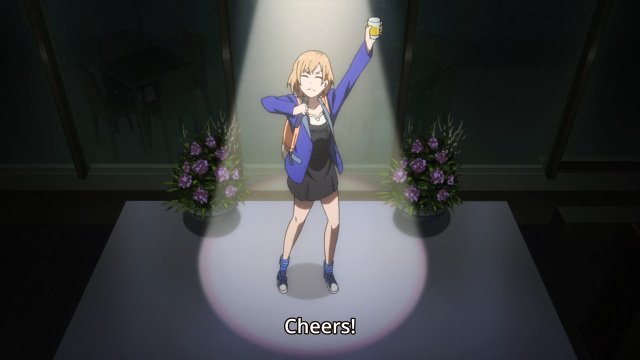
It is important to understand Shirobako, as are most of our “successes”, and as is the phrase “cynically optimistic” itself, bittersweet. In the show’s finale, Miyamori cries, and those aren’t tears of pure joy, but tears of relief at a pressure lifted, until the next one, always the next one. Bittersweet is also how I’d describe the show’s emotional peak, the scene where Zuka, poor Zuka, who had to watch from the side as all her friends got closer to their dreams, or to someone else’s dream, at least, finally got a chance, and Miyamori couldn’t contain herself and cried, and cried hard. This was more than just deserves, this was the joy of a friend’s joy, of a resting point in one’s journey of life, and a good one.
And now, just as Shirobako had done, I will keep on going past the closing point, and present a few more. I resented Shirobako’s ending, which even aside from Zuka’s end that was “too good”, and yet bittersweet, the show delivered many “awesome moments” for us to fistpump the air – from the casting down of “Funny Story”, to dangerous driving’s final demonstration, to Miyamori receiving her well-deserved accolades. There were too many endings, and the show was fully optimistic after I had considered it a true ally to me, in spreading cynicism and caution of the world my younger friends will face as they enter the real world. But this was the ending it always promised, and all the clashes, all the tears, they were still there, not as paving stones that were necessary to reach the “Good Ending,” no, that’s optimism that’s too much of a bold-faced lie even for Shirobako to countenance, but as acquaintances we passed on the route to a “Good Enough Ending”.
And finally, that optimism is more than just a moral. It’s sometimes necessary. Shirobako had delivered to us Tarou, who was an exquisitely crafted character, to be hated. And then it had given us Hiraoka Daisuke, who wasn’t a bumbling fool, but maliciously inefficient. He is an important character in the show, and his background was framed not as a mirror of Miyamori, but as where she could’ve ended up without the optimistic ending of the show. Someone who cared, who tried hard, but whose projects ended up failing, who ended up drowning under others’ workload and then not recognized for his efforts and sacrifices.
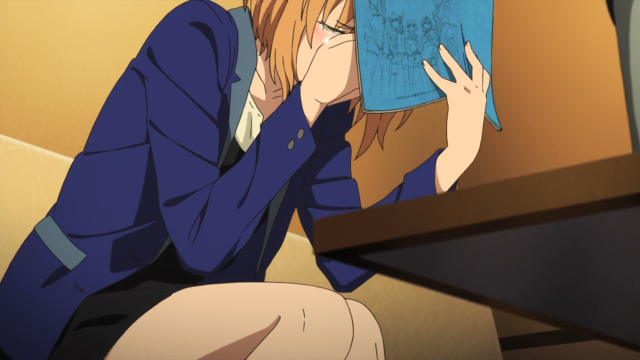
Hiraoka was an example of what you end up with after optimism is stripped away entirely, and that’s more than just cynicism, but the urge to create more of your own kind. Hiraoka, just like others in the show, did not see a future for himself, so acted as one with no future, and with nothing to lose. He was hiding his own hurt, and his own optimism, lest he be hurt again.
And that is why I can’t really place fault with the show for its optimistic ending, because if you strip optimism away, what will you end up with? And even with its optimistic ending, as they say, it’s the journey that matters, and this journey was decidedly bittersweet. Sure, it may have ended well, but it wasn’t perfect, neither the journey nor the show, and that is honesty of its own kind. Besides, I can’t fault a show for being true to its nature and not conceding to my own wishes, which are born of my own cynically optimistic nature, a nature that fears hoping, lest it be hurt, again. But to live is to be hurt.
And just like the show, I will allow myself a final overt message, about what the show is really about (though it’s also about many other things): It’s not about what you will make of your life, but what you’ve made of it. But what you’ve made of it does rely to some degree on what you would’ve made of it, in some point in the past. It’s not about having dreams, but what you’ve made of them. And that does demand that you dream, and hope.
(Shirobako has good direction, sound, voice-acting, and storyline. It’s a “real slice of life”, rather than a cutified one. This is why I appreciated its cynicism, but was also unduly surprised by its optimism. I award it 9/10 “Perfect is the Enemy of Done”. Watch it.)
All the images in this post were made for promotional purposes and/or fall under the jurisdiction of fair use.
This post has originally been posted on my blog here, and has been reformatted and updated as needed for Steemit. You can verify I am the blog owner by scrolling to the bottom of the right sidebar.
You mentioned the transition period where one is bestowed with more responsibility, but this was poorly done in Miyamori's case. At first she is overwhelmed, like most people are upon getting a new job, but come the second cour, where she is bestowed more responsibility after finally getting the hang of her job, she barely struggles at the harder and more demanding job.
I'd disagree that Tarou is meant to be hated, but he is meant to frustrate the viewers. This isn't exactly well done either because the majority of anime viewers are teenagers and young adults who probably haven't worked all that much. The frustration with Tarou isn't as obvious to someone who doesn't have much experience in the workplace, which is part of a larger problem with the show.
There's little reason to connect with most of the characters for the audience. If we take into account the large number of teenagers watching, that's a group that will have trouble understanding the show in the way it was intended to be understood. Then, if we add in the people who can't connect easily to characters without much to them, we're restricted to Miyamori and maybe a few others that the audience will easily connect to. I find it an odd choice to aim a show about working to working age people because it doesn't make a lot of sense to sell a show about stress, deadlines, and frustrating tasks that need to be done to people who experience that on a day-to-day basis.
I don't see Shirobako as an excellent show, but as a show that does its job and finishes. It does display how an anime studio might function and how the workplace usually plays out, but there's inconsistent entertainment value depending on the demographic watching.
Thanks for the reply!
I'm not sure I agree. First of all, Miyamori's difficulties come from lack of belief in her own capabilities and knowledge, more than lack of skill and talent to do what she needs to do. The "get more responsibilities" is something we're scared of, but not necessary something we're not ready for.
And about the second cour, I'd just recommend thinking of it as a second season, and the reason they did that was so the show could move from Miyamori's personal issues to the larger picture of her surrounding. The show outgrew that conflict, and a single cour was enough to cover it, I'd say. And she still struggles, but now she struggles with dealing with the work situation around her and the issues of those she works with. Also fitting for someone in a mid-management role.
I think our disagreement here is semantic, rather than substantial. I also think most teenagers can sympathize with how frustrating dealing with someone like Tarou is - even in school, we have to hand in group projects, or groan at someone who holds up the class with all their dumb ideas.
And it's possible that teenagers won't get as much out of the show as adults, and that's fine. Not all shows have to be for everyone to the same degree, and in the same ways.
Again, not all shows are made for all people. There's a reason shows about adults are so rare in anime. But a show about the transition to adulthood probably has more of an audience. And not all shows make an economic sense, but I'm still glad some of them are made.
And yet, the show sold well enough, so your judgment of the situation is probably missing something.
I think we're not going to agree on what the show is trying to do, or its themes. "How an anime studio might function" is a far tertiary goal. "Entertainment" has many different meanings, but I think here the classical one is a good one, one which is less about "funny and light fun," and more about providing consideration to a topic.
I also find my thoughts on the characters and their interactions to be different from yours, and the show's success and how most people discuss it also seem to differ, I find.
This is very beautiful
Well, it is fiction so it is hard not to feel a certain level of contrivance in the resolutions. Perhaps if the anime showed a bit more after the climax (just a few episodes) then this would be less obvious.
A story's ending point is always arbitrary. I think if they kept at it it might've been a bit less obvious in this case, but it would've also diluted the show's message and themes, so they've probably made the right call.
Congratulations! This post has been upvoted from the communal account, @minnowsupport, by Thunder_God from the Minnow Support Project. It's a witness project run by aggroed, ausbitbank, teamsteem, theprophet0, someguy123, neoxian, followbtcnews/crimsonclad, and netuoso. The goal is to help Steemit grow by supporting Minnows and creating a social network. Please find us in the Peace, Abundance, and Liberty Network (PALnet) Discord Channel. It's a completely public and open space to all members of the Steemit community who voluntarily choose to be there.
If you would like to delegate to the Minnow Support Project you can do so by clicking on the following links: 50SP, 100SP, 250SP, 500SP, 1000SP, 5000SP. Be sure to leave at least 50SP undelegated on your account.
This post has received a 0.35 % upvote from @drotto thanks to: @banjo.
Congratulations @geekorner! You have completed some achievement on Steemit and have been rewarded with new badge(s) :
Click on any badge to view your own Board of Honor on SteemitBoard.
For more information about SteemitBoard, click here
If you no longer want to receive notifications, reply to this comment with the word
STOP© Guy Shalev 2015.